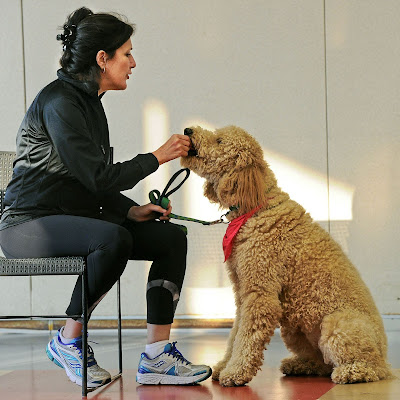Just like raising a child, they need supervision, training and PARENTING. Although training a puppy takes patience, it does not have to be an ordeal if you follow this advice.
1. As mentioned before, supervise your puppy. Keep a close eye on him or her. If you cannot, then you need to place the dog in a crate. Set up a FULL DAY schedule for the pup. Set times for eating, walks, playtime, etc. Keep the animal busy so that he or she does not get bored or into trouble.
1. As mentioned before, supervise your puppy. Keep a close eye on him or her. If you cannot, then you need to place the dog in a crate. Set up a FULL DAY schedule for the pup. Set times for eating, walks, playtime, etc. Keep the animal busy so that he or she does not get bored or into trouble.
2. Teach your puppy RESPECT. Even your most domesticated dog has some of their wolf instinct. Their top instinct is to "follow a leader." It is up to you to establish that leadership. After that, training will become easier as he or she will obey and not challenge you.
3. Be POSITIVE. Never raise your voice at your puppy. You should never use physical forms of punishment such as hitting. This will result in behavioral problems and may even cause the negative "wolf instinct" to surface. Limit the use of electrical shock collars. If you successfully train your dog into obedience through commands, they will never be necessary.
4. Like a child, puppies need to know that nothing in life is free. The most popular item of the training tool. Hold back play times, fun walks, treats and such until he or she learns to behave.
5. Teach them "NO" from day one. Let them know that jumping, barking, biting, etc. will not be allowed. Love them up when they behave well and ignore them or walk away when they misbehave. They will catch on that if they want their playmate, they need to behave.
6. You can correct behavior problems catching the puppy in the act and using a brief, loud yet subtle sound maker. In time, your dog will catch on. Eventually, he or she may even correct their behavior. When that happens, praise them, treat them, love them up, etc. Remember, canines do not recall what happens three minutes earlier, so scolding them some time after the fact will not help their behavior.
7. Never combine your dog's name with a negative term. A simple "NO" is all. Use their name only for happy times or praises. Do not make your dog scared of approaching when you call his or her name.
8. Keep training sessions short. A dog's attention span is short. If you carry on too long, you pup will become bored and quit trying.
9. Bonding is crucial. Have fun with training. If your puppy looks forward to the training, he or she will be eager to learn. Talk with your pup while training. You may even invite friends over during the earliest times of training so that he or she can get use to others. Make sure your dog does not shy away from company. Also, get him or her use to sound making items such as the vacuum cleaner or lawn mower.
Whether you are training your dog to be obedient or you want to take it to advanced competition style, remember there are different talents for different breeds. Stephanie Taunton said, "some dogs train well for show or sports" and others are mentally built as more of an assistance animal. Choose your breeds well to match your preferred activity.












